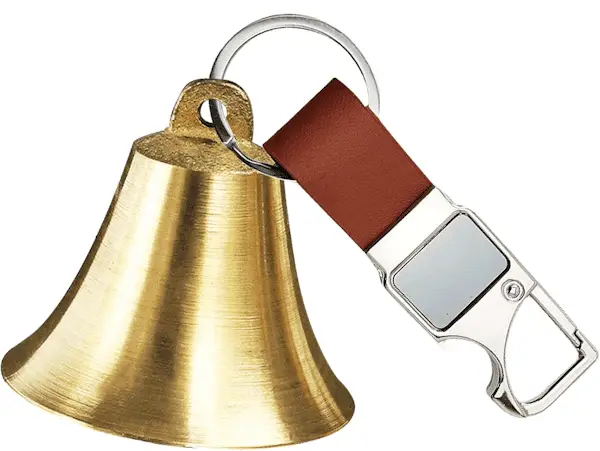Bear bells are sold all over the place and I’ve certainly seen them on some of the trails out West. But do bear bells work or are they just another way for companies to make money off our fears?
No, bear bells do not do a good job of warning bears that humans are in the area. This doesn’t mean that they’re completely useless but it is important to know their limitations.

What Are Bear Bells: A Hiker’s Jingle on the Trail
Bear bells look just like those festive jingle bells you might use during the holiday season, but these are more for safety than celebration. As the name suggests, bear bells are meant to alert bears to your presence.
So, here’s how it works: You attach the bear bell to your clothing or backpack. Then, as you’re walking along, enjoying the great outdoors, the bell jingles with your movement. The sound is meant to let any bears in the area know you’re coming. After all, the last thing you want is to surprise a bear – they’re not big fans of sudden visitors.
The bells usually have a magnet that can silence them when needed. You might choose to use one, or maybe even a few if you want to make extra sure you’re heard. People have been using these bells for years, especially in places like North America and Japan where bears are part of the local scene. But there’s an ongoing debate: Do these jingly accessories really keep us safe, or are they just a comforting noise in the wilderness?
The Science Behind Bear Bells
When it comes to bear bells, everyone seems to have an opinion. But what does the science say? Well, it’s a bit of a mixed bag, actually.
There haven’t been a ton of scientific studies on the effectiveness of bear bells, which makes drawing a definitive conclusion tricky. But let’s chat about the research we do have. One study, for instance, from Yellowstone National Park in the U.S., suggested that bears didn’t really respond to the sound of bear bells. This raised some eyebrows and had people questioning if the bells were more of a comforting sound for hikers rather than a deterrent for bears.

On the flip side, there are some studies that show that bear bells do have some merit. Some of these studies include: “Effectiveness of Bear Bells as a Deterrent to Brown Bears” by Nelson and Stenhouse (2003), “Efficacy of Bear Deterrents in Alaska” by Smith et al. (2008), and the “Effectiveness of Bear Bells for Reducing Human-Bear Conflicts” by WildSafeBC (2019).
There’s also quite a bit of anecdotal evidence from hikers and outdoor enthusiasts who swear by their bear bells. They believe that any noise, including the jingle of the bells, helps alert bears to human presence. After all, avoiding surprise encounters with bears is the primary goal.
In conclusion, while the science isn’t quite settled, what we know so far is that bear bells might not be the foolproof bear deterrent that some people hope for. But more research is needed to give a conclusive answer. And in the meantime, being cautious and aware of your surroundings when in bear country is always a wise choice.
Does Sound Scare Bears Away
When it comes to bears, does sound really send them scampering? Well, it’s not about scaring them off exactly, it’s more about letting them know we’re around.
Bears are naturally curious creatures but typically try to avoid humans. The element of surprise, like bumping into a bear on a quiet trail, is what often leads to dangerous encounters. So, the thinking goes, if you make noise while hiking, a bear will hear you coming and will likely move away to avoid you. It’s less about fear and more about giving them a heads-up so they can steer clear.
However, the type of noise matters. A bear’s hearing is similar to humans, so high-frequency sounds like the jingle of a bear bell might not be as effective as our voices or other lower-frequency, natural sounds. Experts suggest that talking loudly, singing, or clapping your hands could be more effective at alerting bears to your presence.
Pros Weigh In: What Wildlife Experts Are Saying
So, we’ve talked about the science, but what do the folks who deal with wildlife every day think about bear bells? Let’s dive into the insights from the experts.
Most wildlife professionals agree that making noise in bear country is a good idea. The goal is to avoid surprising a bear – because let’s be real, no one wants to be on the receiving end of a startled bear’s reaction. However, the jury’s still out on whether bear bells specifically are the best way to make that noise.

Some experts believe that the jingling sound of bear bells isn’t loud or distinct enough to effectively alert bears to a hiker’s presence. They suggest that human voices, singing, clapping, or even banging pots and pans, can be more effective.
And then there’s bear spray – it’s a hot topic, pun intended. A lot of professionals see bear spray as a more reliable line of defense against bear encounters. But they also stress that knowing how to use it correctly is crucial.
In the end, the experts’ consensus seems to be this: bear bells alone may not be enough, but they could still be part of a broader safety strategy. Pair them with other noise-making methods, always carry bear spray, and most importantly, stay alert and informed when you’re out there in bear country.
Beyond the Bell: Other Tactics to Stay Safe in Bear Country
If you’ve been following along and are now wondering if there’s an alternative to bear bells, you’re in luck. There are indeed other strategies you can use to stay safe while hiking in bear territory.
First off, your voice is one of the most effective tools you’ve got. Talking loudly, singing, or even telling lame jokes – basically, any human sounds – are likely to alert a bear to your presence. Clapping your hands or banging hiking poles together can also work. Remember, you’re not trying to scare the bear, just let it know you’re around.
Carrying bear spray is another common and recommended practice. This pepper spray specifically designed for bears can deter an aggressive or charging bear if used correctly. Keep in mind, though, it’s a last-resort defense, not something you should be reaching for at the first sign of a bear.

Finally, traveling in groups can be a good deterrent. Bears are less likely to approach larger groups of people. Plus, more people naturally means more noise.
So, while bear bells can still be part of your safety toolkit, they’re not the only, or necessarily the best, option. Always stay aware of your surroundings, respect the wildlife, and remember that the goal isn’t to scare bears away, but rather to let them know you’re sharing their space.
